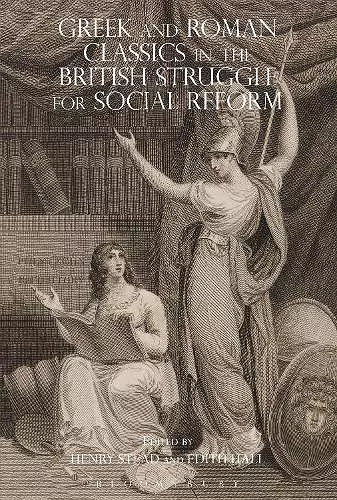Greek and Roman Classics in the British Struggle for Social Reform
Edith Hall editor Dr Henry Stead editor
Format:Paperback
Publisher:Bloomsbury Publishing PLC
Published:15th Dec '16
Currently unavailable, and unfortunately no date known when it will be back

An interdisciplinary volume exploring the important role classical ideas and education played in the British struggle for social reform from the Romantics to the 1960s.
Greek and Roman Classics in the British Struggle for Social Reform presents an original and carefully argued case for the importance of classical ideas, education and self-education in the personal development and activities of British social reformers in the 19th and first six decades of the 20th century. Usually drawn from the lower echelons of the middle class and the most aspirational artisanal and working-class circles, the prominent reformers, revolutionaries, feminists and educationalists of this era, far from regarding education in Latin and Greek as the preserve of the upper classes and inherently reactionary, were consistently inspired by the Mediterranean Classics and contested the monopoly on access to them often claimed by the wealthy and aristocratic elite. The essays, several of which draw on previously neglected and unpublished sources, cover literary figures (Coleridge, the ‘Cockney Classicist’ poets including Keats, and Dickens), different cultural media (burlesque theatre, body-building, banner art, poetry, journalism and fiction), topics in social reform (the desirability of revolution, suffrage, poverty, social exclusion, women’s rights, healthcare, eugenics, town planning, race relations and workers’ education), as well as political affiliations and agencies (Chartists, Trade Unions, the WEA, political parties including the Fabians, the Communist Party of Great Britain and the Labour Party). The sixteen essays in this volume restore to the history of British Classics some of the subject’s ideological complexity and instrumentality in social progress, a past which is badly needed in the current debates over the future of the discipline. Contributors include specialists in English Literature, History, Classics and Art.
This collection explores some unfamiliar byways and usefully reacts against ... the idea that classical culture was used as a barrier to keep the workers out. * Times Literary Supplement *
The first substantial published product of the pioneering Arts and Humanities Research Council ‘Classics and Class in Britain 1789-1939’ project ... [features] a sparky introduction ... [and] is full of unexpected gems ... A pioneering project, and one full of potential for expansion and elaboration in terms both of subjects and of individuals. * Classics For All Reviews *
The aims of the volume are to be commended, and a book such as this provides a means for the reader to add some all-important (modern) historical context to his or her study of the ancient world. * Classics Ireland *
It is an important achievement of Stead and Hall’s volume that it succeeds in showcasing a wide range of contexts in the history of British social and political reform where the Greek and Roman classics have played a role in shaping, inspiring and legitimising a progressive and reformist agenda ... To render this elusive, complex dialogue more visible and graspable for the reader is the real achievement of [their] volume. * The Classical Review *
A bold and theoretically sophisticated look at the relationship between Greek and Roman classics as cultural property and social class in Britain. This volume demonstrates that while it is the case that access to classical education maintained barriers it is also irrefutably true that reform-minded people from all classes appropriated the classics in compelling ways, and that a diversity of engagements with the classical world characterizes this unruly period in British history. Anyone interested in the future of classics should read this account of its past. -- S. Sara Monoson, Professor of Political Science and Classics, Northwestern University, USA
ISBN: 9781350019164
Dimensions: unknown
Weight: 540g
384 pages